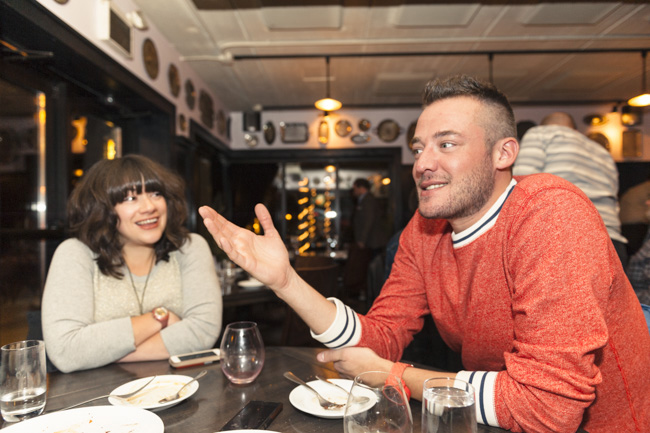
Upfront is the Heavy Table’s effort to bring attention to the “front of the house,” and to generate discussion and debate about service in the Upper Midwest and beyond. Consisting of in-depth interviews, this series focuses on the experience of those who say, “Yes, Chef.” What, to them, constitutes “good service”? How do hosts, servers, bartenders, sommeliers, and managers navigate the dining environment as more and more self-identified “foodies” and self-appointed mixologists take to social media and dash off reviews on Yelp even before closing out their checks? How does front-of-the-house staff deal with the social, emotional, and physical demands of service? We really don’t know — so we decided to ask. (See the first installment of this series: Tim Niver of Strip Club Meat and Fish.)
Q AND A WITH NICOLE WEILER AND TIM MULHAIR
A few months ago, we met Nicole Weiler, a razor sharp, vivacious woman who splits her time waiting tables between Barrio in the Minneapolis-Saint Paul airport (Terminal 2) and The Craftsman in the Longfellow neighborhood of Minneapolis, all while studying at the University of Minnesota. Because Weiler could compare food service in the airport and “streetside” (server lingo for restaurants outside the airport), we knew we had to interview her for this series. She brought along Tim Mulhair, an insightful, charismatic bartender who also does double-duty at the airport (Barrio) and streetside (Jet Set in downtown Minneapolis). Weiler and Mulhair previously worked together in the G-concourse in Terminal 1, but left for Barrio just before G-Concourse implemented iPad service — both feared the new technology would reduce service to food delivery. Over an epic dinner at Corner Table, we had a lively conversation about the peculiarities, challenges, and opportunities of serving crowds who always have a flight to catch.
Job Security
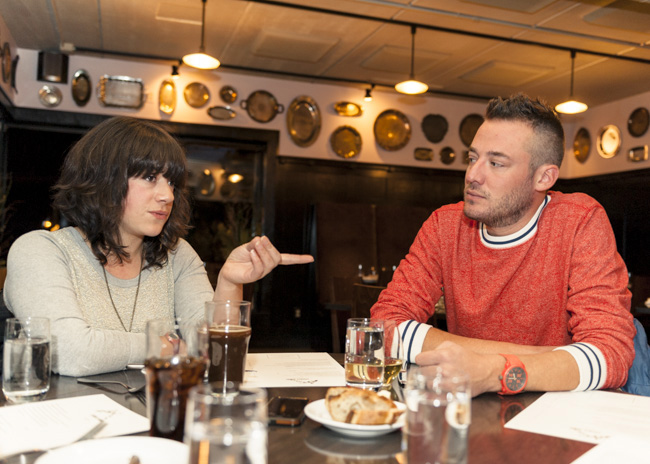
HEAVY TABLE: What are some of the biggest differences between serving in the airport and outside the airport?
NICOLE WEILER: Well, it takes a long time to get to work, for one! And you still have to go through security every day and pay for parking. You get a staff rate, but … And making sure that you keep track of your badge, ’cause … if you lose that badge, it’s a hundred dollars to replace it. … And you can only lose it twice. The third time, it will be surrendered, and you can’t work in the airport for two years.
… You have to pack your bag correctly. You can’t bring your favorite drink into work. … If you want to have kombucha or something while you’re working, you have to go buy it at that inflated, five-dollars-a-bottle price.
TIM MULHAIR: And I think not having regulars, not having your friends come by to see you. It’s a weird thing. … People are like, “I can’t even go look at your restaurant, because it’s behind security.”
HEAVY TABLE: How often do you have to have trainings about security, regulations … ?
WEILER: We don’t?
HEAVY TABLE: You don’t?
MULHAIR: Not once you’re badged. … Which is an interesting process.
WEILER: You have to be fingerprinted and have an FBI background check to work at the airport.
MULHAIR: To get your badge — and that takes a couple of weeks too, which can be interesting for staffing. Like if we need a server — someone just quit — you can hire someone, but they can’t work until they have a badge.
Dining by Default
HEAVY TABLE: Nicole, you mentioned before that some people at the airport act like they’re at a food court. What do you mean?
WEILER: People will come in groups to the airport if they’re going on vacation with friends or family, or they have kids. And they’ll go to Subway, next door, and one person [in their group] will come in and get a beer, and then all of a sudden there’s three people sitting with them eating Subway. … I often say something like, “I’m sorry, but this a restaurant, we can’t have outside food.” It’s really strange. You would never just go get Subway and then come into Corner Table and be like, “I’m cool. He’s eating. I’m okay. I got a sandwich.”
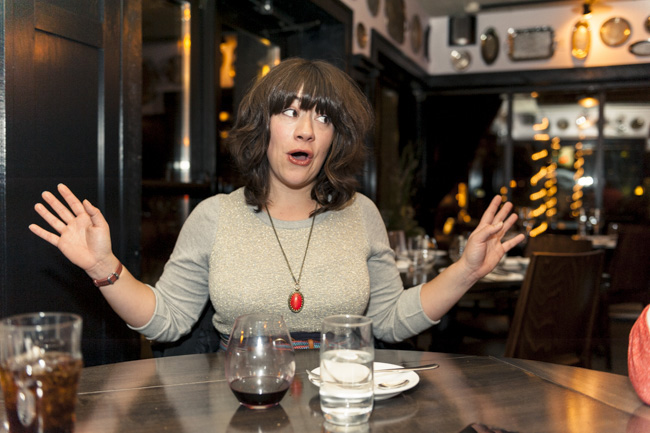
It would be one thing if it was just a bar and we didn’t have food. But we have an entire restaurant. … But it’s true that Barrio is progressive for a Midwestern, tiny-terminal airport. And so it’s kind of a unique experience that people are not coming to your place of business on purpose. … They’re coming because they’re hungry and you’re there. So it can be really fun to get people to try new things, or it can be really disappointing because they’re trying to make, you know, a carnitas taco into a hamburger.
HEAVY TABLE: So carnitas is adventurous?
WEILER: Oh yeah, absolutely. And the more Americanized restaurant in our terminal has been closed for two months, and they serve burgers and fries and they have a chicken Caesar wrap. … So in the last two months, we’ve been serving a plethora of people who don’t necessarily want to be in our restaurant.
MULHAIR: It’s very rare when somebody comes in and says, “Oh, I love Barrio. I knew this was here. I want to get a margarita and some pork carnitas tacos.” Once in a while you’ll get someone like that and I’m always like, “Awesome!” Because they aren’t just here by default.
Vegas, Baby!
WEILER: The airport is like Vegas: it’s a chaotic society where there aren’t regular rules. And you feel empowered to drink whenever you want. … I think they start serving alcohol at 6 or 8am, and people are like counting down the minutes.
HEAVY TABLE: That’s really interesting: “What happens in the airport stays in the airport!”
MULHAIR: Yeah, I always joke that vacation starts when they clear security. So people are definitely on vacation mode, … pumped and ready to drink. That happens a lot.
WEILER: I would say that most of my sales are liquor sales. And everything in the airport is more expensive.
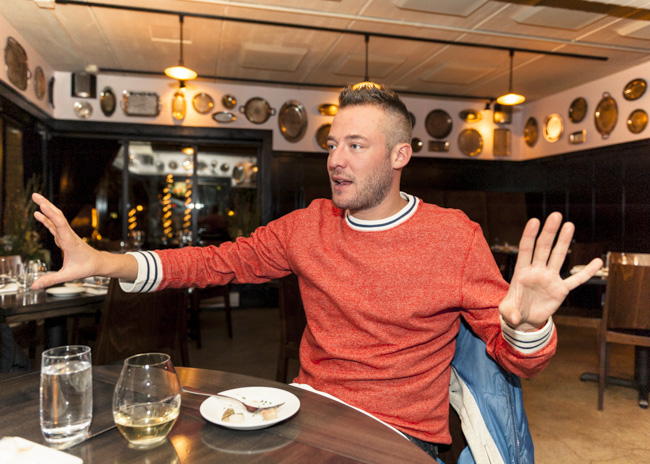
HEAVY TABLE: Do you deal with more high-volume drinkers?
MULHAIR: Yes and no. Sometimes you’ll get someone who is stuck at the airport for six hours, and they’ll have nothing to do but sit there and drink. I’ve definitely seen some really, really wasted people. I have dozens of stories. But because they’re getting on a plane, it’s actually easier to cut someone off. … And then you’ll get a fair amount of people who just have a very short amount of time, so they’ll have three drinks in twenty minutes, or two beers or two shots. … Or you get the nervous flier that is freaking out and needs a couple shots before they get on the plane.
WEILER: You had the one lady who took the Xanax or some sort of anti-depressant, then had one drink and passed out.
MULHAIR: That’s happened a few times, where somebody would take something for motion sickness, like Dramamine or whatever. … I remember this guy came in — a handsome guy, really nice, totally normal — he had a drink, a Jack and Coke or something. And he was maybe halfway through it, and all of a sudden he was a different person. Other people at the bar were getting my attention … like, “This guy is off his rocker!” It was like 20 minutes, and he gets to a point where he can’t even look at you. The guy ends up leaving, leaving his luggage right there. His plane is boarding. He’s down the concourse. He didn’t know where he was. The airport police ended up coming and took him somewhere to help him get his bearings. And the next day I came into work — I remember seeing him walking down the concourse to catch the flight to wherever he was supposed to go. He didn’t stop at the bar that day.
Making Connections
HEAVY TABLE: What do you think is good service in the airport?
MULHAIR: I think it’s more important to be really fast, especially when it comes to having people’s bills, because in the airport there’s a different sense of urgency. People get really worried about missing their flight. It’s everyone’s worst nightmare!
WEILER: Everyone at the airport is like, “We need our bill! We have a flight to catch!” … I try to be snarky-funny, and my standard response is, “Oh my gosh! That’s so glamorous!” People are like, “Oh, God! Of course I have a flight to catch. I couldn’t get in here any other way!”
HEAVY TABLE: You must get a lot of solo diners.

WEILER: Yeah, and I really try to get them talking to each other. We have one gigantic table in the middle of the restaurant, a high-top that seats 16, facing each other … on either side of this big, beautiful waxed-copper table. I love serving that table.When I need to [move on], I can often spur conversations between people. … [To Tim] Do you ever start conversations between people at the bar?
MULHAIR: Absolutely. I definitely try to get people talking. … I’d say about 90 percent of the people are really excited about where they’re going; it’s somewhere fun. People want to talk about what they’re doing, but I hear a lot of the same stories. …
WEILER: They try to rope you into their stories. Which, I don’t want to be rude about, but I’ll be like, “Oh! This person was just telling me about that! You should talk about it!” Disappear. Smoke bomb!
HEAVY TABLE: You probably get a lot of people dealing with emotional stuff — people from family gatherings, from vacations, going back to work —
WEILER: Yes. That’s a good point, especially around the holidays. … One time, this lady left me this gigantic letter, and I was so confused. I thought, “Oh, she forgot this thing,” and then I saw that it was for me. And they had just come back from burying her father; they were on a layover, and she was just having the hardest time. She said that she’d been having the worst experience, … and then just being at this little airport restaurant, someone smiling and being nice just made such a difference. And I was like, “This is the saddest letter I’ve ever read!” But it makes a difference.
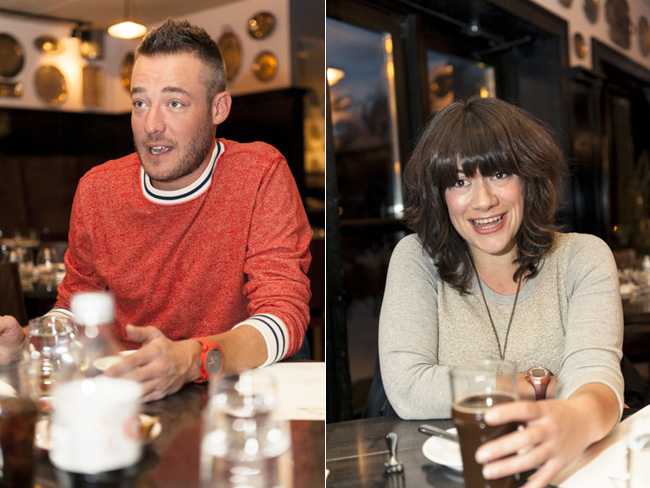
Delays, Chargers, and Chewing Tobacco
HEAVY TABLE: Delays must really affect business.
WEILER: Absolutely. Being in Terminal 2 now, Spirit [Airlines] cancels and delays flights every day. Like every single day. Which makes me love and hate them. Because delays, when they’re short, are fantastic. People are like, “Yeah! I’m gonna go in and get another drink,” or, “I had planned to eat when I get there, but now …” But once they get delayed again and again, then not only are they frustrated and displacing that frustration on us, but they just, they drank way more than they intended to and now they’re a little belligerent.
MULHAIR: You know, they’ll gripe about it, but … they can usually find someone else that’s delayed, too, and will listen to their story and everything’s fine. They just need to vent.
WEILER: I try to use it to my advantage, as a salesperson. If someone’s like, “Aww, I’m delayed,” I’m like, “You need a drink. Let’s make this better for you. We have awesome margaritas. …” It wouldn’t particularly work if people didn’t treat the airport like Vegas. … But that’s the pacifier; … get ’em drinking!
HEAVY TABLE: Are customers using gadgets the whole time?
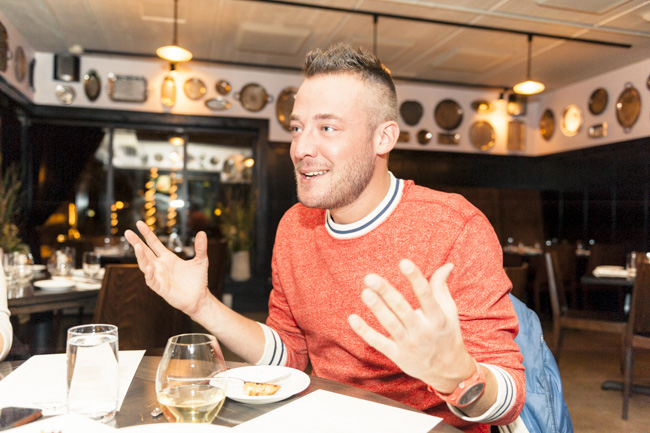
MULHAIR: Definitely. … And one unique thing about our restaurant is that our L-shaped bar has outlets under it, and a bunch of seats along the wall all have outlets, too. The community table has a big power strip mounted on the underside, because everyone has their iPad, their phone, and their computer. And they want to plug all this stuff in. And they’re sitting there using them all, draining battery, and they want to have power to watch a movie on the plane or whatever. … They think it’s brilliant that we have as many outlets as we do.
WEILER: They like it. Although every once in a while someone will come in and be like, “Do you have a charger? … I need a cable for my iPhone.” People seem to get frustrated that we don’t have loaner chargers! I keep one in in my apron that charges the iPhone 4, iPhone 5, and Android. It’s $3 on Amazon, and it often makes me the hero. It saves the day!
HEAVY TABLE: Are there other things people in the airport often ask for?
MULHAIR: Cigarettes.
HEAVY TABLE: Where do they smoke?
MULHAIR: You have to go out through security, and then back in through security. So oftentimes people don’t have enough time. … So I see way more people using chewing tobacco in the airport than in any other place I’ve ever worked: just because they can’t smoke.
WEILER: It’s so gross. People order a beer just to drink it really fast, just to have the bottle to spit in — and then switch to what they normally drink, like a cocktail, leaving the spit bottle for you. [Sarcastically] It’s wonderful.
Nice Work If You Can Get It
HEAVY TABLE: Do you guys recommend working at the airport?
WEILER: I always tell people if they can find a job at the airport, they should totally take it, because you have the opportunity to have a lot of fun. … I love the fast-paced nature. I love … that you get to interact with a lot of different kinds of people. And I think it will make anyone a better server, because you encounter all these strange situations, and society’s rules just don’t seem to apply.
HEAVY TABLE: Do you make good money?
MULHAIR: It’s consistently pretty great. But then there’s those shifts where it’s crazy, where there’s delays upon delays, where you’re just three-deep for six hours. I’ve had some shifts where I’ve literally almost paid my rent in a day. Sometimes I feel like I’m making too much money for opening bottles!
WEILER: Yeah, I say that … I make like $50-$75 an hour, depending on the night, for smiling and carrying things! Tipwise, it’s the opposite of streetside, where the weekends are very busy, which is another part of its appeal. You can work here, then be part of that weekend business at another restaurant.
MULHAIR: It’s a good gig, for sure.
